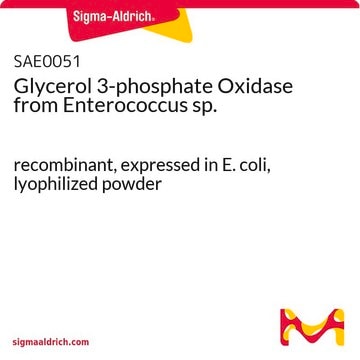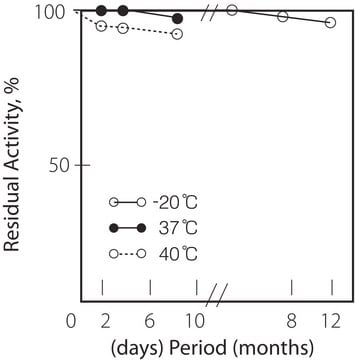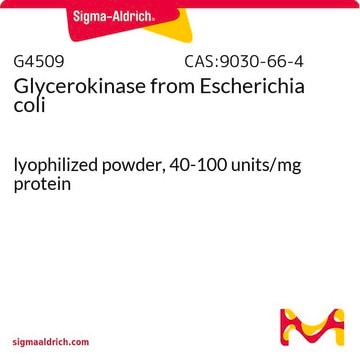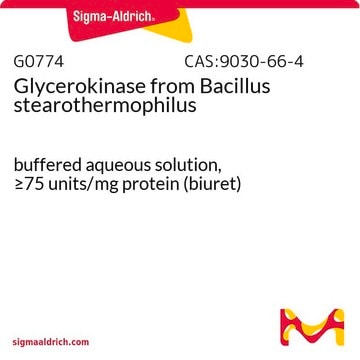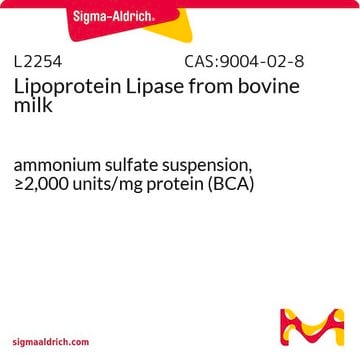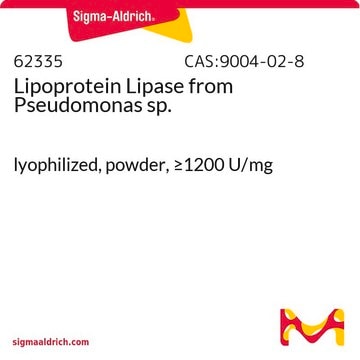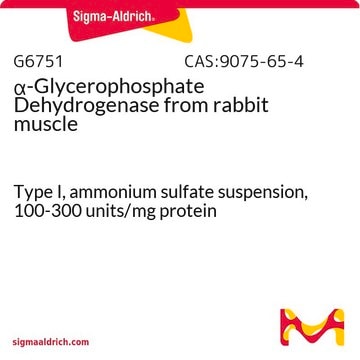G9888
Glycerol 3-phosphate Oxidase from Aerococcus viridans
lyophilized powder, ≥70 units/mg solid
Synonym(s):
sn-Glycerol 3-phosphate:oxygen 2-oxidoreductase, L-Glycerol 3-phosphate Oxidase, GPO
Sign Into View Organizational & Contract Pricing
All Photos(1)
About This Item
Recommended Products
form
lyophilized powder
Quality Level
specific activity
≥70 units/mg solid
composition
Protein, ≥60% Lowry
storage temp.
−20°C
Looking for similar products? Visit Product Comparison Guide
Unit Definition
One unit will oxidize 1.0 μmole of L-glycerol 3-phosphate to dihydroxyacetone phosphate with the formation of H2O2 per min at 37°C, at pH 8.1.
Physical form
Lyophilized powder containing sucrose
Signal Word
Danger
Hazard Statements
Precautionary Statements
Hazard Classifications
Resp. Sens. 1
Storage Class Code
11 - Combustible Solids
WGK
WGK 3
Flash Point(F)
Not applicable
Flash Point(C)
Not applicable
Personal Protective Equipment
dust mask type N95 (US), Eyeshields, Gloves
Certificates of Analysis (COA)
Search for Certificates of Analysis (COA) by entering the products Lot/Batch Number. Lot and Batch Numbers can be found on a product’s label following the words ‘Lot’ or ‘Batch’.
Already Own This Product?
Find documentation for the products that you have recently purchased in the Document Library.
Customers Also Viewed
Albert Premkumar et al.
Physiologia plantarum, 167(1), 90-110 (2018-11-13)
Hypoxia (oxygen deprivation) causes metabolic disturbances at physiological, biochemical and genetic levels and results in decreased plant growth and development. Phospholipase D (PLD)-mediated signaling was reported for abiotic and biotic stress signaling events in plants. To investigate the participatory role
Minakshi et al.
Indian journal of biochemistry & biophysics, 45(2), 111-115 (2008-04-01)
Commercial lipase, glycerol kinase (GK), glycerol-3-phosphate oxidase (GPO) and peroxidase (POD) have been co-immobilized covalently on to arylamine glass beads affixed on a plastic strip through diazotization with a conjugation yield of 89.1 mg/g support and 64.1% retention of specific
Vandana Kalia et al.
Indian journal of biochemistry & biophysics, 39(5), 342-346 (2002-10-01)
A method for co-immobilizing lipase from porcine pancreas, glycerol kinase (GK) from Cellulomonas spp., glycerol-3-phosphate oxidase (GPO) from Aerococcus viridans and peroxidase from horseradish onto zirconia-coated alkylamine glass beads through glutaraldehyde coupling has been described. The co-immobilized enzymes retained 71.4%
Claudine Hames et al.
Journal of bacteriology, 191(3), 747-753 (2008-11-26)
Glycerol is one of the few carbon sources that can be utilized by Mycoplasma pneumoniae. Glycerol metabolism involves uptake by facilitated diffusion, phosphorylation, and the oxidation of glycerol 3-phosphate to dihydroxyacetone phosphate, a glycolytic intermediate. We have analyzed the expression
M G Warren-Perry et al.
Diabetes, 45(5), 639-641 (1996-05-01)
Two genes that have potentially important regulatory roles in insulin secretion are both located on chromosome 2q24.1. G-protein-coupled muscarinic potassium channel (GIRK1) is an inwardly rectifying K+ channel that helps to maintain the resting potential and excitability of cells. Mitochondrial
Our team of scientists has experience in all areas of research including Life Science, Material Science, Chemical Synthesis, Chromatography, Analytical and many others.
Contact Technical Service
